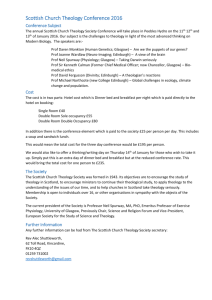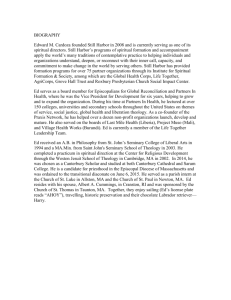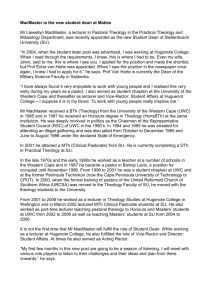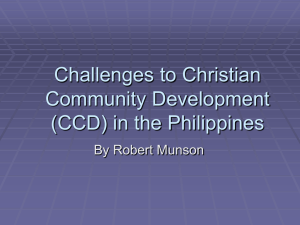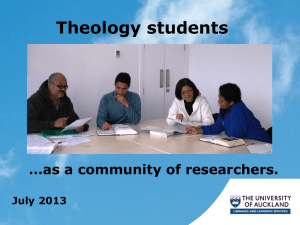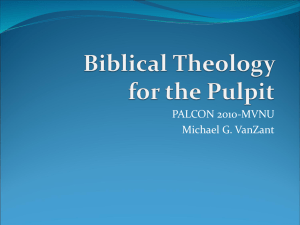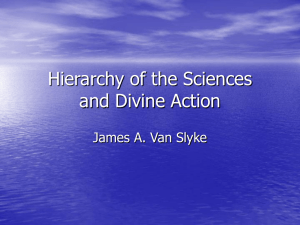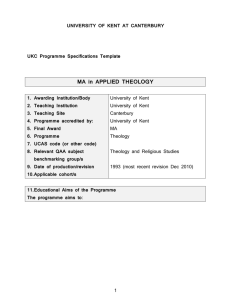The modern culture today is very open to
advertisement
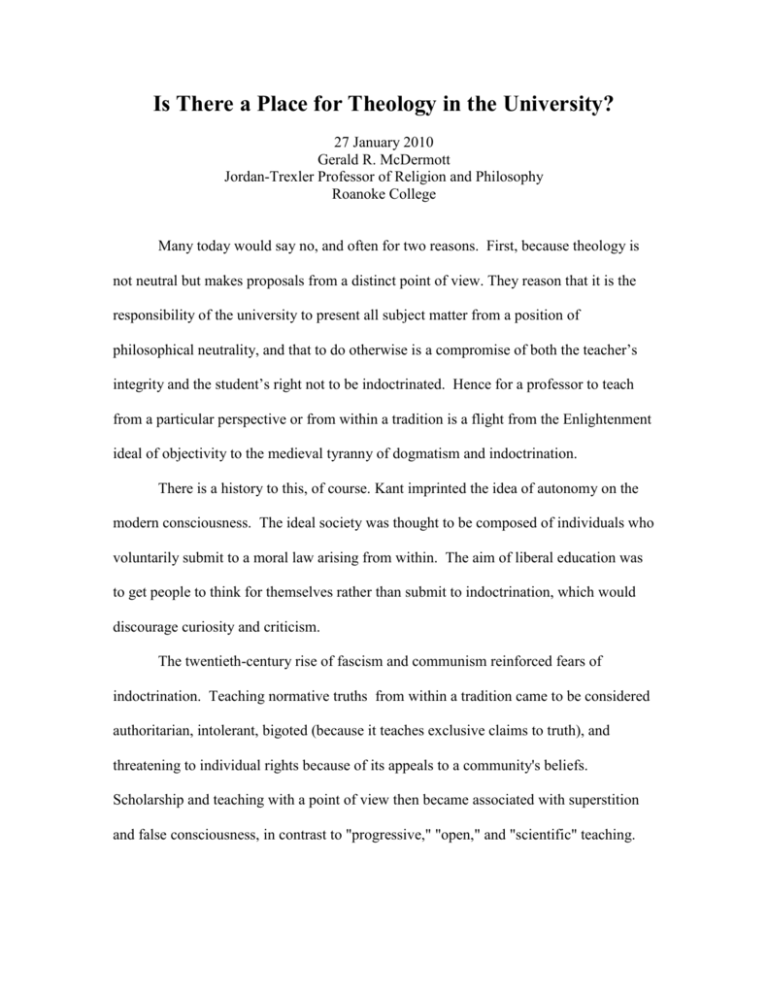
Is There a Place for Theology in the University? 27 January 2010 Gerald R. McDermott Jordan-Trexler Professor of Religion and Philosophy Roanoke College Many today would say no, and often for two reasons. First, because theology is not neutral but makes proposals from a distinct point of view. They reason that it is the responsibility of the university to present all subject matter from a position of philosophical neutrality, and that to do otherwise is a compromise of both the teacher’s integrity and the student’s right not to be indoctrinated. Hence for a professor to teach from a particular perspective or from within a tradition is a flight from the Enlightenment ideal of objectivity to the medieval tyranny of dogmatism and indoctrination. There is a history to this, of course. Kant imprinted the idea of autonomy on the modern consciousness. The ideal society was thought to be composed of individuals who voluntarily submit to a moral law arising from within. The aim of liberal education was to get people to think for themselves rather than submit to indoctrination, which would discourage curiosity and criticism. The twentieth-century rise of fascism and communism reinforced fears of indoctrination. Teaching normative truths from within a tradition came to be considered authoritarian, intolerant, bigoted (because it teaches exclusive claims to truth), and threatening to individual rights because of its appeals to a community's beliefs. Scholarship and teaching with a point of view then became associated with superstition and false consciousness, in contrast to "progressive," "open," and "scientific" teaching. 2 Teaching theology was thought to be merely inculcating ideas without providing sufficient evidence and reasons for proving those notions beyond any doubt. The problem with this criterion is that no discipline of learning passes muster, not even the hard sciences. Physical chemist and philosopher Michael Polanyi has shown that the scientific enterprise depends on a community of scientists governed by tradition and authority. Scientists do not learn by proving beyond a doubt every step in every process of the innumerable processes which are held to be so. Instead there is an apprenticeship of pupils to masters—or as "a modern version of the Apostolic Succession."1 A master can teach an apprentice only if the apprentice can follow the master's example and assimilate unconsciously rules of which neither may be explicitly aware. Hence an apprentice is one who surrenders herself to some extent uncritically to the imitation of another. While she is learning, the apprentice must accept the master's judgments even when she does not know the evidence for them. As Wittgenstein put it, "The child learns by believing the adult. Doubt comes after belief."2 And what about research itself? Shouldn’t it too proceed without any preconceptions, but instead apply the tabula rasa mind to an inductive encounter with naked, empirical facts? A recent generation of scholars in many disciplines thinks this view naive. Take the hard sciences again, for example--the supposed paragon of objectivity. Since the seventeenth century we have been told that science is based on empiricality, objectivity and rationality. Empirical data impress themselves upon the 1 Michael Polanyi, Science, Faith and Society (Chicago and London: University of Chicago Press, 1964), 44. 2 Ludwig Wittgenstein, On Certainty, eds. G.E.M. Anscombe and G.H. von Wright (New York: Harper and Row, 1972), para. 1. 3 observer through the senses (empiricality), the observer collects the data without preconceptions or theories (objectivity), and then concludes in rigorously logical fashion (rationality). But philosophers of science since Thomas Kuhn have rejected this theory of "immaculate perception." They have portrayed the scientific method in practice as full of imaginative leaps. Einstein confessed, "There is no logical path leading to [discovery] or highly universal laws. They are only to be reached by intuition based upon something like an intellectual love . . . . The mechanics of discovery are neither logical nor intellectual. It's a sudden illumination, almost a rapture . . . initially there is a great leap of the imagination."3 If this is true in the hard sciences--at the important junctions of Kuhn’s “scientific revolutions” if not in every scientific experiment--it is more true in the social sciences and humanities. It has now become a truism that one’s social location has as much to do with one’s perceptions as the research that one argues supports those perceptions. Few historians, for example, would agree with historian Hayden White that “we can tell equally plausible, alternative, and even contradictory stories . . . without violating rules of evidence or critical standards,”4 but most today would concede that “just the facts, ma’am” can yield different perspectives on the same historical event by two equally conscientious historians—depending on the point of view they bring to their research. Like theology, the physical and human sciences are human enterprises, shot through with elements of subjectivity but not entirely subjective, and all searching for 3 Albert Einstein, quoted by Lesslie Newbigin, The Gospel in a Pluralist Society (Grand Rapids: Eerdmans, 1989), 31. Hayden White, “Historical Pluralism,” quoted in Peter Novick, That Noble Dream: The “Objectivity Question” and the American Historical Profession (Cambridge: Cambridge University Press, 1988), 602. 4 4 truth. All these disciplines use a variety of criteria including but not limited to empirical data: coherence, simplicity, elegance, explanatory power. If Kuhn is right, even the hard sciences proceed with a point of view, and scientists are just as capable of being blinded by their preconceptions as anyone else.5 Of course the same is true for historians and practitioners of the human sciences, and—theologians. A second reason why theology is sometimes said to have no place in the university is that it is said to provide no knowledge, for real knowledge is founded on empirical research. This proposition is often founded on the convictions that consciousness arises from what is insentient and unconscious, that the mind is nothing more than a product of chemical brain processes, and that all statements about quality (such as meaning, values, ideals spirit) can be reduced to more fundamental quantitative substrata, or are merely subjective expressions of arbitrary preferences, personal or collective. It is important to recognize that all of these propositions--that are often assumed without debate in the university—are unprovable empirically and therefore rest more on faith than empirical experience. Few of those who would oppose theology in the university consider alternatives such as the possibility of real knowledge of non-sensory 5 If Kuhn is right, this is true in their theorizing about the nature of the physical world. But it is also true in their theorizing about the origin and nature of ultimate reality. Think, for example, of the opening verse to Carl Sagan’s book and TV series “Cosmos”: “The cosmos is all there is, was, or ever will be.” One thinks, too, of Richard Dawkin’s statement that “the more you understand the significance of evolution, the more you are pushed away from the agnostic position and towards atheism.” Dawkins, “A Scientist’s Case Against God,” The Independent (April 20, 1992). Or Stephen Jay Gould’s pronouncement, “No intervening spirit watches lovingly over the affairs of nature (though Newton’s clock-winding god might have set up the machinery at the beginning of time and then let it run). No vital forces propel evolutionary change. And whatever we think of God, his existence is not manifest in the products of nature.” Gould, “In Praise of Charles Darwin,” in Charles L. Hamrum, ed., Darwin’s Legacy (San Francisco: Harper and Row, 1983), 6-7. Or the “Statement on Teaching Evolution” passed by the National Association of Biology Teachers in 1998 that evolution is “an unsupervised, impersonal, and unpredictable and natural process of temporal descent from genetic modification that is affected by natural selection, chance, historical contingencies, and changing environments.” The statement was withdrawn later only after protests from Alvin Plantinga and Huston Smith. First Things (February 1998), 75. 5 and supersensible realities. Little effort is made to develop the suggestions made by Polanyi that all knowledge contains mystery and uncertainty, and that therefore in our knowing we must entrust ourselves to the “intimations of the unseen.” Nor do many explore Coleridge’s insistence on the intuitive dimension in all knowing, or the proposal made by both Coleridge and Steiner that qualities are both objective and subjective. If the university is to explore not only physical reality but also the most important issues in life—such as justice and love and meaning—then it must not insist that the empirical is the only way of knowing.6 What’s more--the assertion that the non-empirical must be excluded cannot be proven empirically. Let me close with two observations. First, the university needs theology if it is to consider fully the larger meanings of its other disciplines. Only by being able to locate a new idea within a “big picture” does the best learning take place. To insist on the methodological principle that religious questions (or for that matter, philosophical questions probing the meaning and limits of reality) must be separated from other kinds of questions about truth in the university is to diminish the quality of learning. For, as Newman argued, without religious truth (and I would add, philosophical truth) one cannot see the fullest extent of any particular truth: “If there be religious truth at all, we cannot shut our eyes to it without prejudice to truth of every kind, physical, metaphysical, historical, and moral; for it bears upon all truth.”7 Second, the recognition that there is no research or teaching except from a point of view does not warrant a subjective, self-indulgent free-for-all. No, the proper model 6 This begs the question of the kinds of non-empirical knowing, and what relation if any divine revelation has to any of these. But this is not the place for that discussion. 7 Newman, Idea of the University, 88-9. 6 for research and teaching theology and all the other disciplines must involve fairness, balance and restraint. By fairness I mean that scholars who learn and teach from a point of view (which means all scholars!) should relate their perspectives to others’ within and without their own discipline, and in doing so use scholarly rigor, fairness to others (especially their opponents) and charity.8 By balance I mean that we should take a cue from Stephen Jay Gould, who warns scholars that while they must acknowledge that there is no absolute objectivity, they must not go to the opposite extreme of assuming that objective evidence plays no role in scholarship or that perceptions of truth are entirely relative. What he wrote about science can be said for all learning and teaching: it is a complex dialogue between data and preconceptions.9 Finally, restraint means that good teaching is not indoctrination. Because of the perspectival nature of knowledge and the existence of rival theories within every discipline, teachers of theology will face the temptation to indoctrinate no more than teachers in other fields. It is incumbent upon us all not to be subtly coercive in our teaching by implying students are unethical or less academically competent if they do not accept our point of view. But at the same time we should not be afraid to introduce students to claims, practices and sensibilities that may be new to them. To speak metaphorically, it is our task to lead students to a new country. We should not expect students to change their citizenship but to see and hear and taste a bit of life in that new See George Marsden, “Christian Advocacy and the Rules of the Academic Game,” in Bruce Kuklick and D.G. Hart, eds., Religious Advocacy and American History, (Grand Rapids: Eerdmans, 1997), 3-27, esp. 10, 18. 8 9 Stephen Jay Gould, Wonderful Life: The Burgess Shale and the Nature of History (New York: W.W. Norton, 1989), 244; cited in Paul A. Carter, “Seldon’s Choice: Variations on a Theme by Asimov,” in Kuklick and Hart, eds., 207. 7 land. We can ask them to open their eyes and ears to what is truly other, but we cannot expect them to get new passports. That is up to them.



